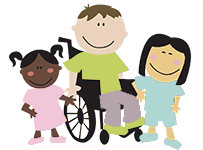With the increasing number of high-tech gadgets that our kids are exposed to these days, it is essential for therapists and parents to learn how to use iPads and Android-based tablets as tools to enhance the therapy process. While there are seemingly unlimited educational apps available to download, a few types of apps stand out, including articulation, language, and AAC apps.
 The first group of apps that are recommended for additional home practice are articulation apps. After a speech therapist helps a child achieve correct articulatory placement, it can certainly be more fun and motivating to use interactive iPad apps to practice producing a targeted sound than to read a list of words or use paper flash cards. Many articulation apps also offer data collection tools, so that progress can easily be tracked over time and shared with your child’s therapist. It is important to have your speech therapist advise you on sound production since there is a developmental hierarchy which would determine what sounds are appropriate for a given age and also whether to focus on initial, medial, final position as well as whether to focus on word level or phrase level.
The first group of apps that are recommended for additional home practice are articulation apps. After a speech therapist helps a child achieve correct articulatory placement, it can certainly be more fun and motivating to use interactive iPad apps to practice producing a targeted sound than to read a list of words or use paper flash cards. Many articulation apps also offer data collection tools, so that progress can easily be tracked over time and shared with your child’s therapist. It is important to have your speech therapist advise you on sound production since there is a developmental hierarchy which would determine what sounds are appropriate for a given age and also whether to focus on initial, medial, final position as well as whether to focus on word level or phrase level.
 Another group of apps that can be used in conjunction with speech therapy are receptive and expressive language apps. Some of my favorites are apps that address following directions, particularly multi-step directions including basic language concepts such as spatial concepts, quantitative concepts, and temporal concepts. Your child’s therapist can provide information about which of these concepts should be targeted. Many iPad apps aimed at increasing verbal productions allow the child to record his or her voice. What is more motivating than answering a question or telling a story, and then having it played back in a fun, modified voice such as a robot or chipmunk voice?
Another group of apps that can be used in conjunction with speech therapy are receptive and expressive language apps. Some of my favorites are apps that address following directions, particularly multi-step directions including basic language concepts such as spatial concepts, quantitative concepts, and temporal concepts. Your child’s therapist can provide information about which of these concepts should be targeted. Many iPad apps aimed at increasing verbal productions allow the child to record his or her voice. What is more motivating than answering a question or telling a story, and then having it played back in a fun, modified voice such as a robot or chipmunk voice?
More and more people are also using iPads and Android-based tablets for augmentative and alternative communication (AAC) purposes. There are a wide variety of AAC apps available, ranging from a two-button screen giving only two choices at a time (yes/no, more/finished, etc.) to fully functional speech generating apps with word prediction. These advanced AAC apps are becoming competitive with dedicated high-tech AAC devices. As a bonus, they are not only smaller and lighter than most dedicated high-tech AAC devices, but they are also much less expensive.
We need to follow our kids’ lead when it comes to motivating activities. Most of my kids are highly interested in the colors, sounds, and animations that an iPad offers. In addition, many iPad apps offer immediate visual and auditory feedback for correct and incorrect responses. For recommendations on specific apps that would help your child achieve his or her therapy goals, contact your child’s speech therapist!

Comments (0)